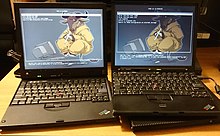Libreboot
 | |
 两台被修改过的ThinkPad X60手提电脑正使用Libreboot做为其固件 | |
| 原作者 | Leah Rowe[1] |
|---|---|
| 首次发布 | 2013年12月12日 |
| 当前版本 | 20220710(2022年7月10日) |
| 原始码库 | |
| 平台 | IA-32、x86-64、ARMv7[2] |
| 类型 | 固件 |
| 许可协议 | GNU通用公共许可证第三版[3] |
| 网站 | libreboot |
Libreboot(原名为GNU Libreboot)是一个目标为取代专有的BIOS固件的自由软件,仅执行最少的工作来加载并执行现代的32位或64位操作系统。
特征
[编辑]Libreboot被设置为没有专有的二进制大型物件的coreboot[4]。但Libreboot并不是coreboot的直接分支;相反地,其与它的上游coreboot并发且紧密合作,并会把所有上游的新东西引入自己的原始码里面,并尽可能将补丁合并回上游。除了移除专有软件以外,libreboot也会试着透过组建自动化与简化安装过程来让coreboot更易于使用[5][6]。
Libreboot项目做出让一些ThinkPad、Chromebook与MacBook手提电脑与伺服器和工作站主板的完全自由变体可以正确执行的修改[7][8]。根据其本身的文件,它可以执行任何在显示上使用核心模式设置(KMS)的Linux发行版,而Microsoft Windows不被支持,Libreboot也不鼓励使用它。而对BSD的支持程度则多半未经测试,但是有一些成功让OpenBSD与NetBSD开机的回报[9]。
历史
[编辑]自由软件基金会(FSF)认可Libreboot[10],其也在2016年5月14日成为GNU计划的官方项目[11]。然而,在2016年9月16日时,做为对GNU计划因为员工回报性骚扰而开除一名跨性别员工的回应[12],Libreboot的首席开发者Leah Rowe宣布抵制FSF并将Libreboot从GNU计划中移除。FSF方面则于2016年9月16日公开否认这些指控[13]。Rowe则于2016年9月23日进一步指控FSF“不让Libreboot离开”[14]。Libreboot贡献者则指称Leah Rowe决定从GNU单方面分离,并把她的个人意见当作整个Libreboot社群的意见发布,但也没有事先问过其他贡献者[15]。到了2017年1月,理查德·斯托曼宣布将Libreboot从GNU计划中移除[16]。
2017年4月2日,对GNU的批评被移除,而系统管理员Alyssa Rosenzweig也宣布了Libreboot网页不再仅一人控制。对于歧视性开除的谣言是否属实,她说“也许是。也许不是。”Leah Rowe也在信中道歉:“伤害了很多人,其中大多数人并未参与任何相关的事件。”[17]三个星期后,在一篇在Reddit上的贴文中,Rowe澄清说,她仍持续参与Libreboot,但已不再担任项目领导人。她也对离开GNU表示遗憾,并表示大多数的Libreboot开发者都赞成重新加入[18]。
安全问题
[编辑]2017年5月1日,英特尔确认并修复了一个在其管理引擎固件中的远程提升权限漏洞CVE-2017-5689[19],这是一个Coreboot与Libreboot社群长久以来怀疑是否存在的漏洞[20][21]。每个配有英特尔标准管理、Intel主动管理技术或是小型企业科技的英特尔平台,从2008年的Nehalem微架构到2017年的Kaby Lake微架构都在IME(英特尔管理引擎)中有远程安全漏洞[22][23]。IME中的另一个安全漏洞则与Intel vPro有关,硬件可以透过它来远程存取,严重的话,电脑甚至会被摧毁[24]。
支持的系统
[编辑]Libreboot的系统支持包含了下列的系统:[8][25][26]
- 伺服器主机版:华硕 KFSN4-DRE与华硕 KGPE-D16
- 桌面型主机版:华硕 KCMA-D8、英特尔 D510MO、技嘉 GA-G41M-ES2L与Apple iMac 5,2
- 手提电脑:华硕 Chromebook C201、联想 ThinkPad X60/X60s、联想 ThinkPad X60 Tablet、联想 ThinkPad T60(部分例外)、联想 ThinkPad X200、联想 ThinkPad R400、联想 ThinkPad T400、联想 ThinkPad T500、Apple MacBook 1.1与Apple MacBook 2.1
参考资料
[编辑]- ^ Libreboot project contributors. libreboot.org. [2016-05-14]. (原始内容存档于2017-04-04).
- ^ Coreboot ARM. coreboot. 2013-10-15 [2014-02-01]. (原始内容存档于2015-09-07).
- ^ libreboot's COPYING file. notabug.org. [2016-09-16]. (原始内容存档于2017-04-22).
- ^ Libreboot. Free Software Foundation. [2014-07-31]. (原始内容存档于2016-03-04).
- ^ About the libreboot project. Libreboot. [2015-04-25]. (原始内容存档于2015-08-16).
- ^ Replace your proprietary BIOS with Libreboot. Free Software Foundation. 2014-08-04 [2017-08-09]. (原始内容存档于2016-03-04).
- ^ Gay, Joshua. Respects Your Freedom hardware product certification. Free Software Foundation. 2012-10-09 [2015-02-25]. (原始内容存档于2016-03-22).
- ^ 8.0 8.1 Hardware compatibility list. Libreboot. [2016-05-19]. (原始内容存档于2017-02-20).
- ^ Answers to Frequently Asked Questions about libreboot. Libreboot.org. [2017-08-09]. (原始内容存档于2016-03-19).
- ^ Campaign for Free BIOS — Free Software Foundation — working together for free software. fsf.org. [2015-10-15]. (原始内容存档于2016-03-19).
- ^ Libreboot, Coreboot Downstream, Becomes A GNU Project. Phoronix. 2016-05-19 [2016-05-19]. (原始内容存档于2016-05-20).
- ^ Libreboot opposes the Free Software Foundation and GNU project. Libreboot. [2016-09-22]. (原始内容存档于2016-12-08).
- ^ Free Software Foundation statement on 2016-09-16 — Free Software Foundation — working together for free software. www.fsf.org. [2016-09-24]. (原始内容存档于2016-09-26).
- ^ Richard Stallman and GNU refused to let libreboot go, despite stating its intention to leave. Libreboot.org. [2016-09-24]. (原始内容存档于2016-12-08).
- ^ Zammit, Damien. Libreboot Screwup. zammit.org. 2016-09-18 [2016-10-31]. (原始内容存档于2018-06-29).
[the contributors] are not consulted about any of the views expressed on the libreboot.org website when they are hastily published by Leah.
- ^ Stallman, Richard. Goodbye to GNU Libreboot. 2017-01-05 [2017-01-05]. (原始内容存档于2018-04-21).
- ^ Rosenzweig, Alyssa; Rowe, Leah. Open Letter to the Free Software Community. 2017-04-02 [2017-04-24]. (原始内容存档于2017-04-17).
- ^ Larabel, Michael. Libreboot Is Now Considering Whether To RE-Join The GNU. Phoronix. 2017-04-22 [2017-04-24]. (原始内容存档于2020-11-29).
- ^ Intel Active Management Technology, Intel Small Business Technology, and Intel Standard Manageability Escalation of Privilege. 2017-05-01 [2017-08-10]. (原始内容存档于2017-06-06).
- ^ Dr. Roy Schestowitz. ‘Active Management Technology’ is Quite Likely a Back Door, Along With Intel’s UEFI. 2014-06-20 [2017-08-10]. (原始内容存档于2020-10-13).
- ^ Why is the latest Intel hardware unsupported in libreboot?. Libreboot. [2017-05-02]. (原始内容存档于2021-01-21).
- ^ Charlie Demerjian. Remote security exploit in all 2008+ Intel platforms. 2017-05-01 [2017-08-10]. (原始内容存档于2017-05-01).
- ^ Chris Williams. Red alert! Intel patches remote execution hole that's been hidden in chips since 2010. 2017-05-01 [2017-08-10]. (原始内容存档于2017-05-01).
- ^ Richard Chirgwin. 'Occupy' affiliate claims Intel bakes SECRET 3G radio into vPro CPUs. 2013-09-23 [2017-08-10]. (原始内容存档于2018-06-27).
- ^ Larabel, Michael. Libreboot Now Supports An AMD/ASUS Motherboard. Phoronix. 2015-06-28 [2015-07-14]. (原始内容存档于2018-06-29).
- ^ Brad Linder. Libreboot ported to Asus Chromebook C201 (free software bootloader). Liliputing. [2015-10-15]. (原始内容存档于2016-03-05).
